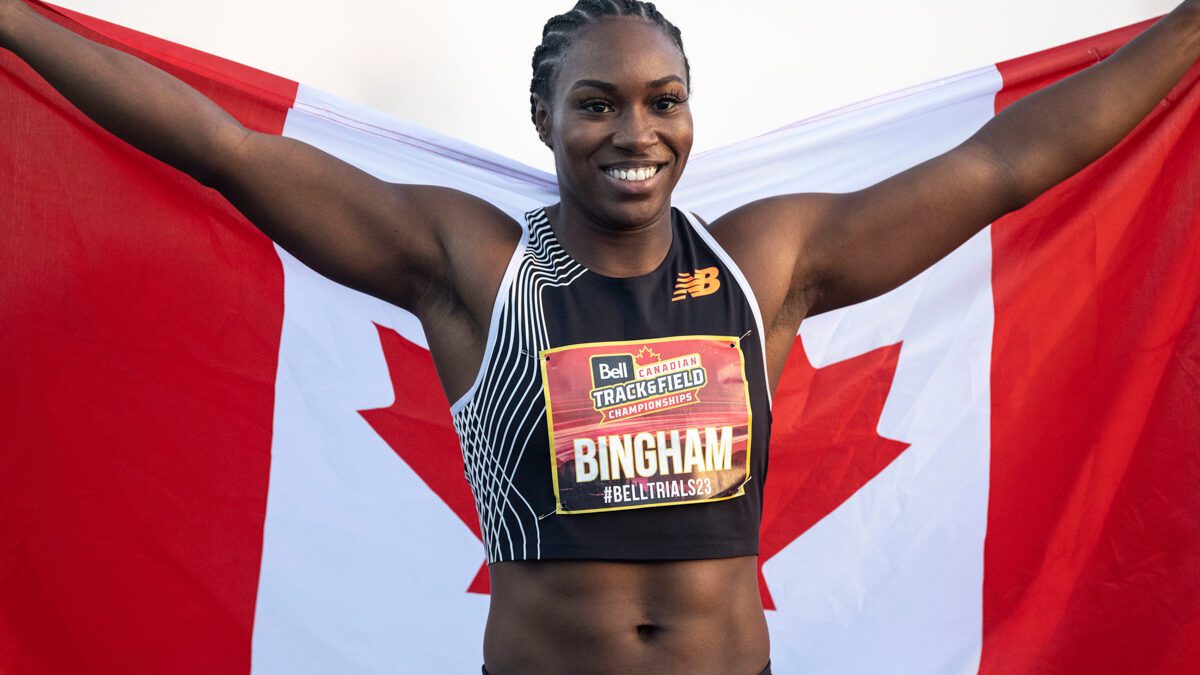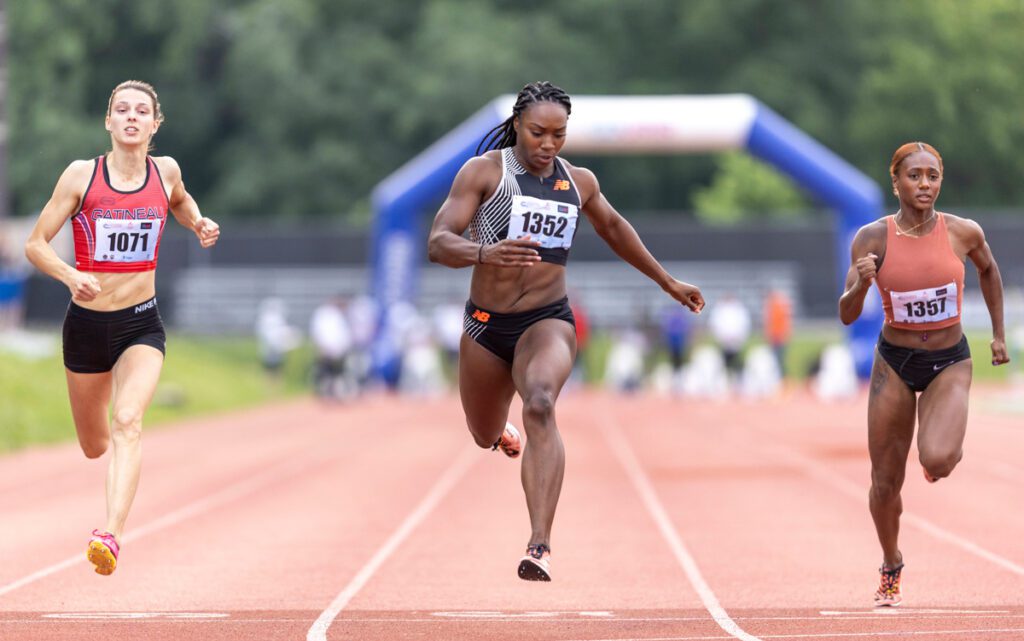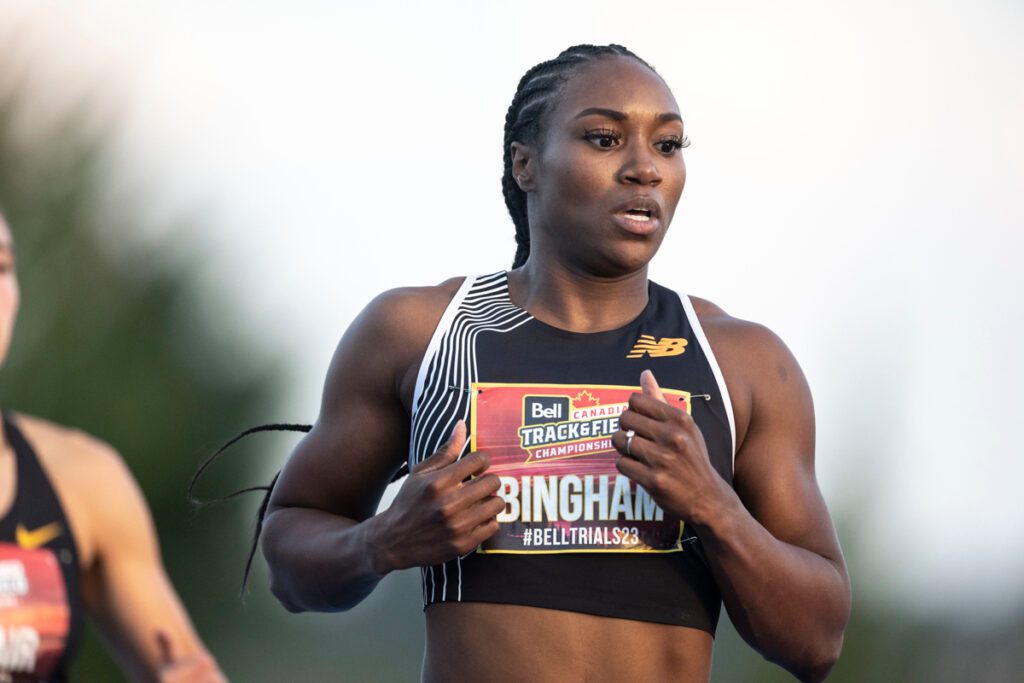Khamica Bingham Forbes: Run Your Way
For Forbes, it's been a gradual process, finding her identity outside of sport—and embracing it fully
 Photo by:
Sean Burges/Mundo Sports Images
Photo by:
Sean Burges/Mundo Sports Images
Representing Canada in the Olympics for the 100m sprint isn’t easy. But for Khamica Bingham Forbes, it feels like she was born to do this, and she has. In fact, she’s done it twice in Rio and Tokyo, and is now looking at Paris 2024 as her third chance to make the Olympic team. Since she began her professional career as a junior back in 2010, she’s collected an impressive number of medals and trophies, most recently, her third national championship title in the 100 metres, in 2023.

At first, the idea of training for a third Olympic team in the 100m sprint while holding a new job as a coach at Brown University (and moving to Providence, R.I., and setting up a home base there) might sound like an impossible combination. It’s just too much. But for Forbes, it actually feels like just the right amount of busy. Here, the New Balance athlete is talking about juggling work and training, the importance of the mental game, what athletes don’t get asked about often enough, and leaning into an identity that contains multitudes.
Combining work and training in an Olympic year
Since moving to Providence in November 2022, Forbes has adapted to the cold. (She spent the five years prior in Louisiana at LSU, so she had been dodging winter for a while.) She’s finally used to it, and is now working as the operations co-ordinator for the track and field program at Brown—a seemingly wild choice in an Olympic year, but for Forbes, it’s all upside.

“Now, as long as I have my laptop, I can get work done everywhere,” she says. “For me, having something else beside always just training is good. It keeps my mind on something else. And organization is a big thing for me. If I can utilize my organizational skills in any kind of way, and also be able to start to build out what that transition will look like for me after my running career ends—because I’m not going to run forever—that’s ideal. The more productive I am, the better, honestly.”
She learned that the hard way: “Back in 2016, I actually took a year off school, because I wanted to focus on making the Olympic team, but I was so unproductive and my mind was all over the place,” she recalls. “The next year, as soon as I enrolled back into school, that’s when I had that balance again. For me, I like to be able to juggle a few things.”
You have to love a woman who loves a well-organized Excel spreadsheet, and who can also sprint 100 metres in just over 11 seconds.
The gymnast who loved to run
As a young kid, Forbes loved sport, and was involved in figure skating and gymnastics. Her dad was her constant companion, flooding his backyard to make an ice rink and creating a belted contraption to help her master backflips before her gymnastics instructors could teach her. But then, she tried a track race—the 100-metre sprint—and won.
“The 100 was just calling me,” she says. “I was considered fast in my gymnastics classes: we would do sprint tests and I felt like that was one of my strengths. I always believed in myself that I was the fastest. I just always felt like I had that in me. And then when I did win that race in Grade 6, I fell in love with it. There was nothing else that intrigued me enough. I felt like, in a way, it chose me.”
That confidence—like the ability to do a backflip—is in part due to her dad’s influence. “My dad was really big into sports: He would go above and beyond,” she says. “When someone like that is there motivating you and pushing you and creating a good environment for you, you have that confidence. When I started track, for two years, my dad came to every single practice. And he wasn’t just cheering me on, he was like, ‘I’m running with you.’ So he would run with me and my teammates, and push us so that we could be better. My dad was a really big component in instilling that childlike confidence that has carried through for me.”
More than just a race
In past interviews, Forbes has been vocal about wishing that reporters asked about more than just “How did the race go?”, especially after a major event like the Olympics.
“I understand from a technical standpoint, they want to know ‘What was the plan? Did you execute that plan? How did it go?’ And I get that, but I would rather it be that, and then more of a chance to really tell your story,” she says. “At the end of the day, we’re all humans, and people draw towards others based on their story. We share a lot of similar experiences. The Olympics is a platform with great exposure to a wide range of people that you’re able to reach. And so, I want to be able to talk about how, just four months before the Tokyo Olympics, I lost my mom, and I had to navigate through grief and still train and push through. I want to share that for someone else who might be going through a moment like that.”
Racing is also about visibility. Forbes has often pointed out that you can’t be what you can’t see, and that’s what keeps many girls from getting into sport. “I feel like a lack of visibility and this lack of depth with athlete interviews breeds more of an issue with identity,” she says. “A lot of us athletes have identity issues, because the focus is only about us as an athlete and our performance. If you’re performing well, then you have more opportunities. Then you start to feel like if you’re not performing well, if you’re not this athlete, then nobody cares. I think just being able to have more spaces or more platforms where athletes can really tell their story in some way matters. I’m not just a sprinter. I’m not just a Canadian athlete. I’m like a cumulation of all of the experiences that I’ve had, and the lessons, and the journey.”
Look good, feel good, run fast
On the flip side, there are a lot of young girls that have no athlete identity because they can’t imagine combining their current identities and hobbies with being an athlete. Girls in particular often feel as though they need to fit a specific mould—and Forbes felt that pain as a teen, too.
“I struggled with that in high school,” she says. “I wanted to be fierce on the track. But I still wanted to be really feminine. And it was like, how can I possibly be both when it seems like if you do sports, you have a certain type of body. Now that I’m in my 20s, I love my body. And I’m so sad that I hated my body for so long when I was young. I just felt like I couldn’t be those two things at once. And now, I want to be able to help those who are in high school who feel like that, and let them see that you can be all of these things at once.”
For Forbes, it’s been a gradual process, finding her identity outside of sport—and embracing it fully. In recent years, there have been more and more women in track and field who are unapologetic in their love of style, from hair to nails to makeup, on and off the track. And Forbes has created her own unique style.
“A lot of my acceptance came from realizing what my body can do and seeing the doors that it opened for me,” she says. “When you’re younger, you focus on wanting to fit in. That’s all I wanted to do: fit in and be like everybody else. And then as I got older, I was like, wait–it’s okay to stand out. You don’t have to be like everybody else. Once I really fully embraced that, then I really started to love the colour of my skin, I started to love my body, I started to love my natural hair. I was able to embrace my true authentic self more fully.”
Now, watch Forbes at the track. She shows up. “I want to look good, I want to feel good, I want to run fast, and so yeah, I show up full glam. We are putting on a show. This is entertainment.”
What does “Run Your Way” mean to Forbes?
“To me, Run Your Way means following your specific journey on your own path. Run Your Way means it’s not going to look like what others are doing. Whatever comes on your pathway for your journey–the hurdles, the obstacles, the lessons, the happy moments, the sad moments, the disappointing moments… That is your pathway to be able to tell your story. And for me, I want my pathway to be able to share my journey with others. I want to be able to share more about the internal things. What were all of the things that helped Khamica to become the person and athlete that I am today on that journey and how I’m using something that I love, running, to be able to tell the story of how I got here, how I got to become the person that I am.”

